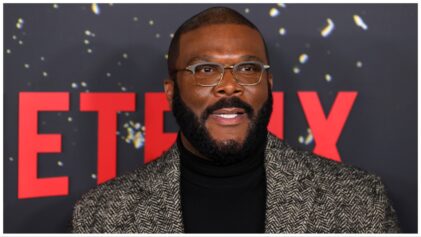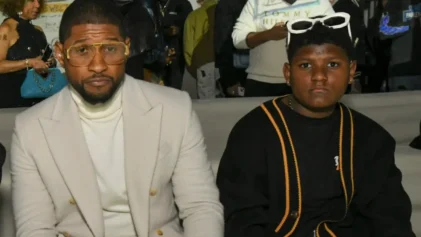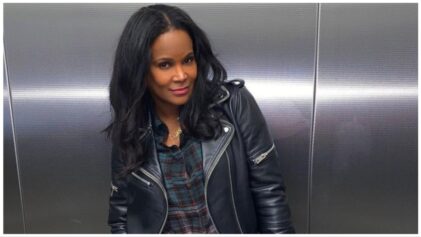Usher is fearless. Since coming on the scene almost two decades ago, the singer has successfully switched up his style. He’s embraced R&B with “Confessions Part II” and “Burn,” gone the pop route with “OMG” and “DJ Got Us Fallin’ In Love” and even dabbled with hip-hop on “Yeah!” and its similarly felt successor “Little Freak.” Truthfully, the crooner has never been afraid to explore different sounds and if any of his albums signal his diverse sonic curiosity, it’s his new album, Looking 4 Myself.
After the release of his last LP, Raymond v. Raymond, Usher spent time globe-trotting and was inspired by sounds stateside and abroad. His discoveries led him to explore electronic and dance sounds with producers such as Diplo and Swedish House Mafia. Musically, he calls Looking 4 Myself a “soulful interpretation” of what has captivated his ears during his travels.
His seventh studio effort comes at a time when R&B artists have crossed the lines of dance, electronic, pop and hip-hop, leaving some fans wondering if the genre has been deserted. But with Looking 4 Myself debuting at No. 1 on the Billboard charts and “Climax” peaking at No. 1 on the R&B/Hip-Hop charts, listeners are still showing interest in what Usher brings to their earbuds.
The father of two spoke with The BoomBox about his new effort, thoughts on why R&B is not dead, the missing Jermaine Dupri and Swedish House Mafia tracks from his LP and seeking out EDM staples like Skrillex and Calvin Harris rather than traditional R&B producers.
Why the name Looking 4 Myself on this album? What is Usher in search of?
“Looking 4 Myself” is one of the more experimental songs that I had on the album. During my hiatus, I basically did a lot of traveling. I did a lot of experimental sowing. I went to the Coachella Music Festival. I went to Ibiza. I traveled to Germany. I went to Vegas, I went to Miami, I went to South of France. All these different places just to listen to the music I felt was really significant in terms of energy. Some of it a little bit more electronic, some of it a little bit more dance. Some of it, a bit more world.
It was a band by the name of Empire of the Sun, and they really inspired me to do the song “Looking 4 Myself.” I passed that to Rico Love. And basically their deduction of the inspiration was “Looking 4 Myself” the song. The song began to give me an idea of how experimental I could be. And I began working with producers who I normally wouldn’t work with or that I admired, like Diplo. I was a little bit more open to working with producers from out of the country. So the musical journey of Looking 4 Myself was more of into experimental music. I began to think about there is no specific genre to put anything in anymore. While R&B artists are admired for having incredible voices, it seems now that a rapper could be an R&B artist. It seems now that an R&B artist could be a rapper. There’s really no barriers, no boxes right. So I began to create this album that was not genre-specific but just experimental, and how I felt and what I really enjoyed listening to. Now at the end of all of that experimenting and sowing, whatever you want to call it, one thing I thought would stick with that mission was [the title] Looking 4 Myself. It really sounds like my musical journey.
You’ve talked about the album being “revolutionary pop.” Explain exactly what that sounds like.
I never said that. What happens a lot of times is something is quoted by a writer or misinterpreted by a writer. I think what happened was to kind of find the inspiration behind where I was and what I worked on, it was revolutionary. Like it’s a pop sound, something that would be more relevant. If I had to name it anything it would be a “relevant sound,” a “relevant music.” Based off of what people really want to hear and what they’re listening to. Something that fits in many different categories. I turn on the radio, there it is, I go to an electronic club, there it is. I go to a house club, there it is. A rave, there it is. I go to a concert where a DJ is spinning, there it is. It’s about relevant music.
Can you talk about a song that didn’t go on the final Looking 4 Myself tracklist and who produced it?
I think I did a pretty good job being creative. There were a few people that I would have liked to finish the work with. You know I really wanted to work with Jermaine Dupri on this project. But I think for some reason, didn’t make the connection I wanted to. It wasn’t a matter of me not wanting to, but I felt like I was in a real creative space. I think he was too, but that’s one I wish we were able to make happen. You know me and David Guetta, we talked about working together again. We had this incredible record that me and Luda[cris] worked on for his album but unfortunately did not make it back in the studio to work on a record with my album. I really wish that that would have happened. Those are the main two.
You have a lot of dance music on this album and worked with Swedish House Mafia — Axwell, Sebastian Ingrosso and Steve Angello — on two songs “Numb” and “Euphoria.” Which other electronic dance music (EDM) artists are you a fan of?
Well, in terms of working with Swedish House Mafia, I wanted to work with them ever since I had an appearance with them. They performed with me during my performance at the American Music Awards and we talked about working together. It was an idea and it kind of worked. They said, “We’ll see if we can come to Atlanta, and if we can, we’ll start to work on some tracks, writing, and moving the ball forward.” It was a lot and they’re three different DJs but when they come together, they are a production conglomerate. So tryna get them together at the same time, when I was in Atlanta, we made the most of our time and we cranked out two records.
There was a record, “Way to Count,” that [Swedish House Mafia] did that is not on the album. If there’s any record that did not make it that I thought would have been great is “Way to Count.” But I got to work with dance producers, so why not work with some of the more edgy people. I worked with them.
I spoke with Skrillex about doing some music. And once again I told you about David Guetta. And it was difficult because of schedule. Calvin Harris, I spoke to him, or at least reached out. And also Afrojack. Kaskade. I wanted to do a duet with Little Dragon. And by the way all of these people, like there’s certain hipsters that have sort of crossed over to a very commercial and then there are these cats who are really cool that people may not know and those are the people who I was like, “Let me try something new. Let me be experimental.” And that was my whole point. Why I think a lot of people have began to assume, well R&B isn’t as poignant as it used to be, really I just feel that the philosophy of how we do things are different. I think we have to be open to different styles of music and just be experimental and that right there creates a new following. That’s how styles like rock, punk were created. By way of just mixing and matching things. So that was my idea and the reason why I decided to work with electronic producers.
Why did you choose to work with A$AP Rocky on the LP?
I like him. I think he’s a dope MC. And I like his rawness. You know I’m all about bringing new things and bringing new ideas. I’m all about making an investment in what I know will be the future.
Some say R&B has lost its popularity because of the rise of pop, and you of course are a pioneer of the genre but also mixing different sounds in. How do you feel about that sentiment and the future of the genre?
I think that music is reciprocal. I think that what might seem like old will, in a minute, feel like new. And I think that as long as people can continue to invest in it, it’ll continue to be relevant. I don’t think that R&B is dead, I wouldn’t say that but I do think that new ideas allow a different perspective and that is what my contribution is there.
I’m not only an R&B artist. I’m not only a pop artist, but I do have music that leans more R&B. As a matter of fact, every time I go all over the world and play “Climax,” people can try to identify. Is it a pop record? Is it a R&B record? Or is it just a record that people like? I think that my point was to create just a non-genre-specific record-album and that’s what I hope Looking 4 Myself is seen as.
Your new music video for “Scream” is set at the “Fuerza Bruta” show you performed at in spring. Why did you choose to film it for the video?
Well, I felt everyone did not have the chance to have the “Fuerza Bruta” experience. I felt like the energy of what “Scream” was, was that. And I didn’t want to make a “Thriller” video. I didn’t want to make a scary video. I didn’t want to confuse people, because the word “scream” can go any way. You can think Michael [Jackson], you can think Backstreet Boys. I thought, “Let me give my perspective and try something creative that would tie things into what I’ve already done.”
I shot footage of the performance at “Fuerza Bruta” and some of it was that, and also shot some new footage to tie the story all together. I wanted it to feel a little bit more energetic. The energy was kind of displaced. It wasn’t to be specific of the song lyrics. It was more so to kind of invoke this energy. That’s why I decided to go that direction.
Source: The Boombox


